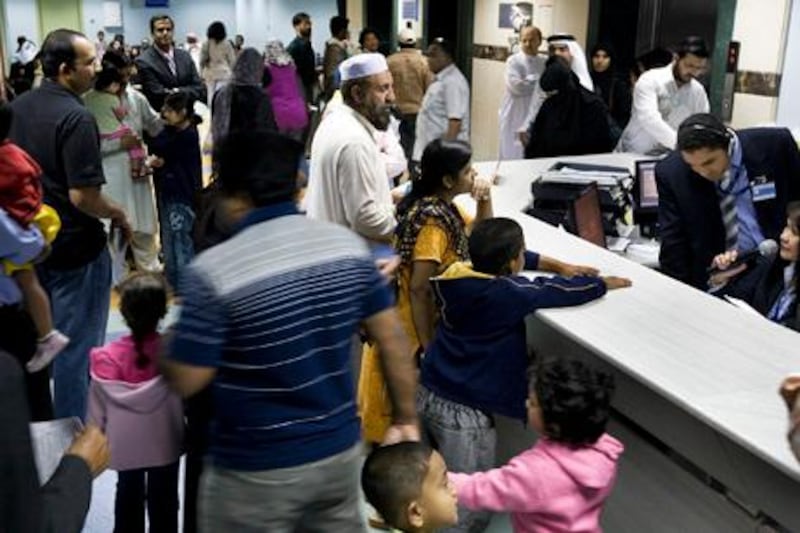DUBAI // An increasing number of people are shunning their family doctor and treating themselves with home remedies, a new survey has found.
The survey, conducted by YouGov Siraj on behalf of the UAE division of Healthy People, found that 87 per cent of people are buying their own medicine from pharmacies before seeking a doctor's opinion, and a third of those took antibiotics without first visiting a doctor.
More than 2,000 were interviewed in the Gulf region for the survey - 781 of whom were in the UAE.
Healthy People, a health communications agency set up in Dubai last month, was formed in response to the survey's results, which also revealed that almost 50 per cent chose health as a concern over financial prosperity, job security or job satisfaction.
However, six out of 10 GCC residents said that they would describe themselves as "unhealthy" and "in need of making lifestyle changes".
"There is a need for a new kind of medical communication and a new approach - one that speaks directly to the patient, not the doctor," said Nadim Khoury, the managing director of Healthy People.
"The average individual is no longer the passive patient of a few years back who gets all his information from the doctor."
Instead, said Mr Khoury, patients were "self-informed", turning to medical series on television such as ER, House and Grey's Anatomy, or using the internet to self-diagnose, self-treat and learn about symptoms and illnesses.
"It's more than that; there are now health magazines targeting every ethnicity, a strong awareness of health in the media, as well as word-of-mouth, of course, and talking to one's friends. This means if they are choosing to self-medicate, we have to put them on the right track."
It was not necessarily bad that patients took matters into their own hands and did not seek a doctor's opinion for the common cold, or a simple headache, said Dr Michel Bombar, a general practitioner at Al Hamra Centre. Many ailments could be treated through over-the-counter medication,
"It lessens the burden on the healthcare professionals and improves the output of medical insurance when patients are not running to their doctors for every tiny thing," he said.
"However, they have to have the knowledge to know when they must seek a doctor's opinion, and how to take care of themselves if they chose to seek an alternative option."
Despite the increased health consciousness among GCC residents and their acceptance that their well-being and health was their responsibility, 64 per cent admitted they were ignoring what they knew about leading a healthy lifestyle.
The main obstacle to being healthy, they said, was difficulty sticking to a healthy diet and exercise plan. "There is social pressure to be healthy and live longer lives, but a reluctance to do anything about it," Mr Khoury said.
A significant minority said their aversion to healthy living was a lifestyle choice that stemmed from a desire to "enjoy life' rather than being health-conscious, which was especially the case for 32 per cent of westerners in the UAE.
Other obstacles included being too hot to walk or exercise outdoors, a lack of time due to work obligations or family commitments, and expensive health clubs and gym memberships.
Social gatherings, where one felt obligated to eat, drink and smoke, as well as limited movement outside the home for Saudi women, in particular, were also listed as obstacles.
What this meant, said Dr Khoury, was an approach to health that targeted health insurance, gyms, fitness clubs, pharmacies, and all the other health outlets a patient reached out to - other than the doctor.
Sumaya al Hosani, 36, said she did not need to go to a doctor to be told that she was overweight, she should exercise, was at risk of diabetes, should not smoke, should be aware of stress. She was educated enough to be aware of the risk factors to health, said the Emirati teacher.
"But this does not mean I am applying all this to my daily life and living by a strict regimen of healthy living, as much as I want to," she said. "It is hard, and requires more work."
Her 14-year-old daughter, Raya, agreed. "We are told things in school like we should snack on carrots, not chips, and we should walk daily, and we should be healthy. It is in the back of my mind but every time I am reminded, I think, oh, I'm not doing that."
Life was too demanding, said Mrs al Hosani; between work obligations and housework and taking care of her family, who had time to schedule daily walks and think up healthy new recipes to keep her children's interest?
[ hkhalaf@thenational.ae ]





